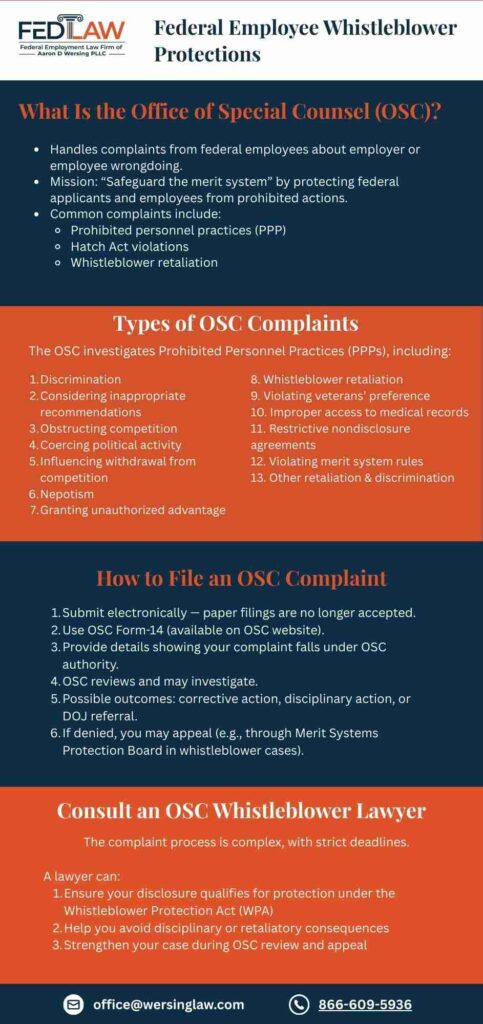
Federal employees who speak up about wrongdoing in their workplace have legal protections.
Unfortunately, retaliation is not uncommon when an employee speaks up about fraud, waste, abuse, or other wrongdoing, thus becoming a whistleblower.
Possible fears of retaliation should never stop you from filing a complaint with the Office of Special Counsel (OSC).
If you suspect wrongdoing at your federal workplace, let an experienced OSC lawyer help.
At the Law Office of Aaron D. Wersing, our skilled legal team can assist with filing your OSC complaint and protect your rights if your employer does engage in retaliatory behavior.
We understand the serious nature of filing a complaint and its potential impact on your federal career.

What Is Office Special Counsel (OSC)?
The Office of Special Counsel handles certain types of complaints from federal employees related to either employer or employee wrongdoing.
The Office’s primary mission is to “safeguard the merit system” by protecting federal applicants and employees from various actions prohibited by federal statutes.
The most common complaints stem from prohibited personnel practices (PPP), Hatch Act violations, whistleblower retaliation, and other similar wrongful acts.
Prohibited personnel practices are defined as employment-related activities that are unlawful in federal workplaces due to their violation of the merit system through improper hiring practices, employment discrimination, and more.
The Hatch Act is a federal law that was passed in 1939. The Act limits specific political activities of federal government employees, in addition to some local, state, and DC employees who work with federally funded programs.
The Hatch Act’s purpose is to protect federal employees from political coercion at their jobs and to ensure that career advancement is based on merit, not political affiliation.
In 1989, the government enacted the Whistleblower Protection Act (WPA), which protects federal employees from possible retaliation in connection with disclosing wrongdoing happening at their federal workplace.
The WPA does not extend coverage to employees outside of the federal government. Those parties have other protections that may apply.
If you’ve spoken up against wrongdoing in your workplace and you are being punished, you need to speak with an OSC federal whistleblower protection lawyer right away.
Types of OSC Complaints
The Office of Special Counsel receives a wide variety of complaints. There are 15 different PPPs that the OSC has statutory authority to investigate and prosecute.
These prohibited personnel practices are:
- Discrimination,
- Considering inappropriate recommendations,
- Obstructing competition,
- Coercing political activity,
- Influencing withdrawal from the competition,
- Nepotism,
- Granting unauthorized advantage,
- Whistleblower retaliation,
- Violating the veterans’ preference requirement,
- Accessing medical records in furtherance of another PPP,
- Imposing a nondisclosure agreement that doesn’t allow whistleblowing,
- Violating rules that implement a merit system principle,
- Accessing the medical records of an employee or applicant in combination with another PPP,
- Other retaliation, and
- Other discrimination.
Examples of complaints the OSC might receive include:
- Claims of discrimination against an employee based on their race or disability;
- Claims of abuse, waste, and fraud;
- Claims that the employer gave special preference to a relative when evaluating their performance, hiring, or promoting;
- Allegations of retaliation for being a whistleblower;
- Allegations of retaliation for filing a complaint or appeal;
- Violation of a merit system principle;
- Allegations of coercive political activity in the workplace, such as asking for donations for a candidate in the workplace; and
- Allegations of retaliation for refusing to obey an order that involves violating a law.
Dealing with a situation that falls under one of the aforementioned prohibited personnel practices can be frustrating. In extreme cases, you may even feel threatened. Unfortunately, some cases of whistleblower retaliation do include threats.
If you are dealing with a serious whistleblower situation that qualifies for an OSC complaint and investigation, you need to take immediate action. Protect your rights and contact a skilled whistleblower complaint lawyer right away.
How to File an OSC Complaint
Currently, the OSC is not accepting any paper filings. So, to file your OSC complaint, you need to submit the form electronically. You can find OSC Form-14 on the OSC website.
In completing this form, you need to demonstrate that the OSC has jurisdiction over your claim, by alleging prohibited personnel practices or unlawful activities that fall within OSC’s authority.
If you are filing a complaint related to a Hatch Act violation or a disclosure of information that alleges agency wrongdoing, you are not required to use the same form. However, OSC does encourage its use in those situations.
After you successfully file your complaint, the OSC will review it and potentially open an investigation. During their investigative phase, the OSC will likely question you about the alleged unlawful activity.
Once the investigation is complete, the OSC will issue a decision. That decision could include a recommendation of disciplinary action, corrective action, or another solution.
Before the OSC takes any further action, it will report its investigative findings to your federal agency’s head and confirm that the proper corrective action is carried out. If the agency refuses to cooperate and take corrective action on its own, the OSC can pursue disciplinary action through the Merit Systems Protection Board (MSPB).
In this particular situation, the OSC will step into the shoes of the prosecutor’s office. While the OSC can seek corrective action in prohibited personnel practice cases, violations involving criminal acts will be referred to the Department of Justice (DOJ).
There is no guarantee that the OSC will open an investigation when you file a complaint. In fact, it declines to take action on the majority of complaints filed. Denials can happen for a variety of reasons.
One common reason for denial is the OSC finding that there was not enough evidence of wrongdoing. However, you do have the right to appeal in certain circumstances.
For example, if your case involves whistleblower retaliation, you will receive a notice indicating your right to pursue your claim through MSPB litigation.
Consult an OSC Whistleblower Complaint Lawyer
While this sounds straightforward, the OSC complaint process is rather complicated, and deadlines can be very strict. When you retain our federal whistleblower protection lawyer, we can guide you through the entire process.
Depending on the circumstances, you could be at risk for disciplinary action, suspension, or other adverse actions from one or more superiors. We understand how frustrating this situation can be.
If you are preparing to file a whistleblower complaint, you need to verify your complaint can stand on its own and survive the initial review. Protections under the WPA only apply in certain circumstances. For example, you cannot pursue a complaint if you did not make a protected disclosure.
Other stringent eligibility requirements apply in whistleblower disclosures. Don’t attempt to pursue a whistleblower claim without first speaking with our experienced OSC whistleblower complaint lawyers.
When you’re searching ‘whistleblower attorney near me’, don’t hesitate to reach out to our highly experienced and knowledgeable legal team.
To learn more about how we can help you file an OSC complaint and protect your rights in the event of retaliation, contact the Law Office of Aaron D. Wersing or give us a call at (833) 833-3529 to schedule an initial consultation.
FAQs
What is the Office of Special Counsel (OSC)?
The U.S. Office of Special Counsel (OSC) is an independent federal investigative and prosecutorial agency. Its primary mission is to safeguard the federal merit system by investigating and addressing prohibited personnel practices (PPPs), whistleblower retaliation, Hatch Act violations, and other wrongful acts in federal workplaces.
What is the Hatch Act and how does it affect federal employees?
The Hatch Act, passed in 1939, restricts certain political activities of federal employees (and some state, local, and DC employees who work on federally funded programs). Its purpose is to:
- Protect federal employees from political coercion in the workplace
- Ensure career advancement is based on merit, not politics
Examples of Hatch Act violations include soliciting campaign donations in the workplace or engaging in partisan activity while on duty.
How does the Whistleblower Protection Act (WPA) protect me?
Enacted in 1989, the WPA protects federal employees who disclose evidence of:
- Fraud
- Waste
- Abuse of authority
- Gross mismanagement
- Substantial danger to public health or safety
The WPA ensures employees cannot be legally punished for making protected disclosures. However, it only applies to federal employees, not private-sector workers.
What types of complaints does the OSC investigate?
OSC investigates a wide variety of complaints, such as:
Improper nondisclosure agreements restricting whistleblowing
Discrimination based on race, disability, or other unlawful grounds
Abuse, waste, or fraud in federal agencies
Retaliation against employees for whistleblowing or filing complaints
Coercive political activity (e.g., asking coworkers to donate to a political campaign)
Favoritism or nepotism in hiring, performance evaluations, or promotions
Violations of veterans’ preference rights
How do I file an OSC complaint?
Currently, OSC only accepts electronic filings. To file a complaint:
- Complete OSC Form 14, available on the OSC website.
- Clearly state how your employer’s conduct falls within OSC jurisdiction (e.g., alleging a PPP, Hatch Act violation, or protected disclosure retaliation).
- Submit the form electronically.
Once filed, OSC will review your complaint, may open an investigation, and can recommend corrective or disciplinary action.
What happens after I file my complaint?
OSC reviews the complaint for jurisdiction and merit.
If accepted, they may open an investigation, which could involve interviews and document requests.
After investigation, OSC may recommend corrective action, discipline, or another remedy.
Findings are reported to your agency’s leadership. If your agency refuses corrective action, OSC may seek enforcement through the Merit Systems Protection Board (MSPB).
Cases involving potential criminal violations may be referred to the Department of Justice (DOJ).
What should I do if I fear retaliation for filing a complaint?
Retaliation for whistleblowing is illegal. If you are punished for filing a complaint or making a protected disclosure, you should:
Consult a whistleblower attorney to protect your rights and guide you through appeals.
Document any retaliatory behavior immediately.
Contact OSC or MSPB depending on your situation.